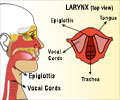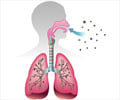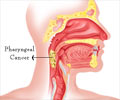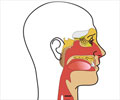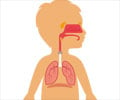- PJ Mehta’s Practical Medicine 19th edition
- The Lippincott Manual of Nursing Practice - Lillian Sholtis Brunner, Doris Smith Suddarth
About
Cough is a symptom of a condition usually affecting the respiratory tract. It may be acute or chronic, wet or dry. The type of cough can help the physician diagnose the underlying condition.
Cough is a protective mechanism that assists in removing foreign particles or excess mucus from the respiratory tract. Thus, in a patient of cough, it is necessary to understand the underlying cause of cough and treat it. Trying to suppress cough is usually not the answer in most cases unless it is extremely tiring.
Depending on the duration, cough may be divided as acute cough that lasts for less than 3 weeks, subacute cough that lasts between 3 to 8 weeks, and chronic cough that lasts for more than 8 weeks. Characteristics of cough in certain conditions are described below:
- An acute cough is usually due to a common cold or flu.
- A dry and hacking cough may be associated with nervousness, viral infections, bronchogenic cancer, or early heart failure.
- A subacute cough where a fit of coughing is followed by a whooping sound may be due to whooping cough or pertussis.
- Conditions that result in dripping of nasal secretions into the throat like allergies and nasal infections can result in chronic cough.
- A person with chronic cough and acidity symptoms like heartburn and regurgitation may be suffering from gastroesophageal reflux disease (GERD).
- Chronic cough with increased mucus secretion in smokers may be due to chronic bronchitis.
- Blood-stained cough in smokers which shows a sudden change in character should be investigated for cancer.
- A person taking medications belonging to the class called ACE inhibitors (examples of these drugs include lisinopril, enalapril, and perindopril) may be suffering from chronic cough due to the medications.
- A person with chronic cough and symptoms like swelling of feet should be evaluated for heart failure.
- Persistent cough with hoarseness of voice may suggest cancer of the larynx.
- Coughing at night may indicate asthma or heart failure.
The causes of cough are listed below:
I. Respiratory Causes:
Conditions affecting the upper respiratory tract: These include -
- Laryngitis and pharyngitis: These are conditions resulting from inflammation of the larynx and pharynx respectively, usually due to viral or bacterial infection. The cough in these cases is usually short lasting and associated with features like sore throat, fever and nasal congestion.
- Whooping Cough: Pertussis infection, which manifests as a severe, whooping type of cough lasts for around 6 weeks. The infection begins with symptoms of tearing, sneezing and a hacking cough at night, which later may even appear during the day. This stage is followed by the next stage where the patient experiences fits of coughing. The fits are followed by a loud sound referred to as a whoop, which happens when the person takes a deep breath.
- Post-nasal drip: Allergies and infections affecting the upper respiratory tract result in dripping of nasal secretions into the throat and stimulate chronic cough. This condition is called post-nasal drip. The patient may experience frequent clearing of throat.
- Throat cancer: Throat cancer refers to cancer of the pharynx or larynx. Besides persistent cough, other symptoms include sore throat, a lump in the throat, difficulty with swallowing, persistent hoarseness and changes in voice.
Conditions affecting the tracheobronchial tree: The trachea and bronchi are the air passages through which air enters from the nose to the lungs. Conditions that affect these passages and result in cough include:
- Bronchitis: Bronchitis is a condition that occurs due to inflammation of the trachea and the bronchi. Acute bronchitis occurs due to infection of the bronchial tree. It often follows an upper respiratory tract infection. Symptoms include fever, cough with mucus production (which may be discolored) and shortness of breath. Chronic bronchitis often affects smokers. It is associated with cough with an increase in mucus production that lasts for few days or months.
- Bronchial Asthma: Bronchial asthma occurs due to reversible narrowing of smaller airways. The patient suffers from cough, breathlessness and wheezing. The cough may or may not be associated with sputum production. Some people suffer from a variant of asthma that is mainly associated with dry and chronic cough. This type of asthma is referred to as cough-variant asthma. The cough may increase with exercise or when the patient is exposed to allergens like cold air or dust.
- Bronchiectasis: Bronchiectasis is a condition where the bronchi are wider than normal. This results in copious mucus secretion and repeated infections. The cough is accompanied by foul-smelling and excess sputum. The cough may be worse when lying on one side.
- Bronchogenic Carcinoma: Cancer of the bronchi causes unexplained weight loss, fever and night sweats especially in prolonged smokers and people exposed to certain chemicals like asbestos. Cancer may result in blood-tinged sputum or bleeding. A change in the type of cough in smokers should be investigated for cancer.
- Aspiration: People who aspirate contents from the food pipe into the respiratory tract also suffer from cough. These patients suffer from swallowing problems. Cough appears while the patient eats or drinks. It also appears when the patient lies down. The patient also suffers from a fear of choking while eating or drinking.
Conditions affecting the lungs: These include -
- Pneumonia: Pneumonia is a lung infection that may be caused by bacteria, viruses or fungi. Symptoms of pneumonia include fever, cough with sputum production, breathlessness and chest discomfort. The sputum is usually discolored and sometimes tinged with blood. The physician can detect abnormal breath sounds on examination with a stethoscope.
- Tuberculosis: Tuberculosis results in chronic cough. It may initially start as a dry cough but later worsens with the production of white sputum. Sputum may be blood-tinged or bloody in later stages. Tuberculosis also produces low-grade fever, especially at night.
- Lung Abscess: An abscess of the lung causes productive cough with foul-smelling and bad-tasting sputum, sometimes accompanied by coughing up of blood. It is usually accompanied by fever.
- Tropical Eosinophilia: Tropical eosinophilia occurs due to filarial infection. It results in persistent cough that worsens at night with wheezing and may resemble asthma. The spleen may be enlarged in tropical eosinophilia. It is detected by a high eosinophil level in the blood.
- Pulmonary Infarction: Pulmonary infarction is a condition where the blood supply to a part of the lung is cut off due to a clot in the blood vessels. The clot usually travels to the lungs from the lower limbs. The patient presents with sudden breathlessness and cough with pink, frothy sputum. The condition is a medical emergency and requires immediate attention.
- Lung Fibrosis: Lung fibrosis occurs due to conditions like inflammation, infection, or exposure to environmental agents like asbestos. The patient usually suffers from dry, cough that is accompanied by worsening breathlessness.
II. Medications: Medications especially angiotensin-converting enzyme inhibitors (ACE inhibitors) like enalapril and lisinopril result in persistent cough. The cough usually goes away on stopping the medication and substituting it with another from a different class of drugs.
III. Conditions Affecting the Heart: Conditions that affect the heart cause a cough that gets worse on lying down. Heart failure results in cough due to accumulation of fluid in the lungs. It is also accompanied by other features like breathlessness especially on lying down, swelling of the feet and easy fatigability.
IV. Conditions Affecting the Digestive Tract: Gastroesophageal reflux disease (GERD), a condition that causes reflux of acid from the stomach into the food pipe, can result in chronic cough. The acid may move upwards into the respiratory tract and stimulates chronic cough. Symptoms of heartburn should be looked for in these patients.
V. Conditions Affecting the Mediastinum: The mediastinum is the central portion of the chest between the lungs. Conditions affecting the mediastinum like enlarged lymph nodes and mediastinal tumors exert pressure on the respiratory tract and may result in dry and persistent cough.
VI. Psychogenic Causes: Cough may be due to psychogenic cough in some cases. A diagnosis of psychogenic cough may be made only when all other causes of cough are ruled out.
VII. Reflex causes wax or foreign body in the ear, subphrenic or liver abscess: Some conditions like wax or foreign body in the ear, or a liver abscess can stimulate a dry and chronic cough. These conditions should be also looked for in a person with no other obvious cause of cough.
Frequently Asked Questions
1. Which doctor should I visit in case I suffer from cough?
You should visit your general physician if you are suffering from cough for a short duration. A more prolonged cough may need the expertise of a pulmonologist.
2. What are the tests used to diagnose the cause of chronic cough?
A chest x-ray is usually requested to diagnose the cause of chronic cough. Other tests that may be necessary depending on the symptoms of the patient include breathing tests to check for lung function, blood tests, sputum studies, other x-rays (such as those of the sinuses), barium swallow and other gastrointestinal tests to check for GERD, a CT scan of the lungs, and bronchoscopy, wherein a tube with a camera is inserted into the bronchi and the lungs are directly studied for any pathology.
3. What are the medications used to treat cough?
Medications used to treat cough belong to two main categories. Cough expectorants are those medications that help to bring out the sputum from the lungs and the bronchial tree. These medications are used in wet cough like those due to pneumonia, bronchitis etc. On the other hand, cough suppressants are medications used to suppress cough that is dry, irritating and disturbing, but non-infectious. It should be remembered that cough is basically a protective mechanism of the body to expel a foreign substance or an infectious agent from the respiratory tract. Thus, suppressing cough may be harmful in some cases and cough suppressants should be used judiciously.




